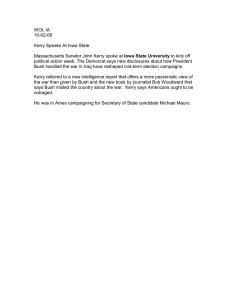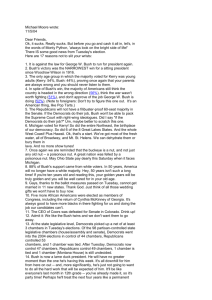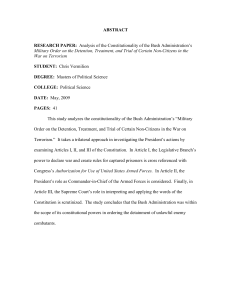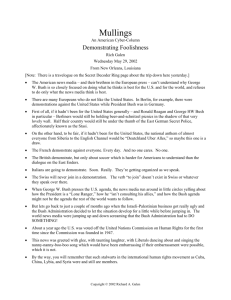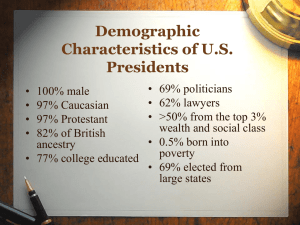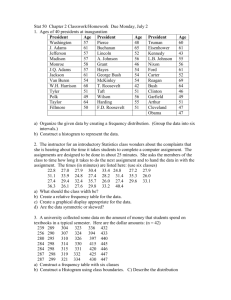Document 11325435
advertisement
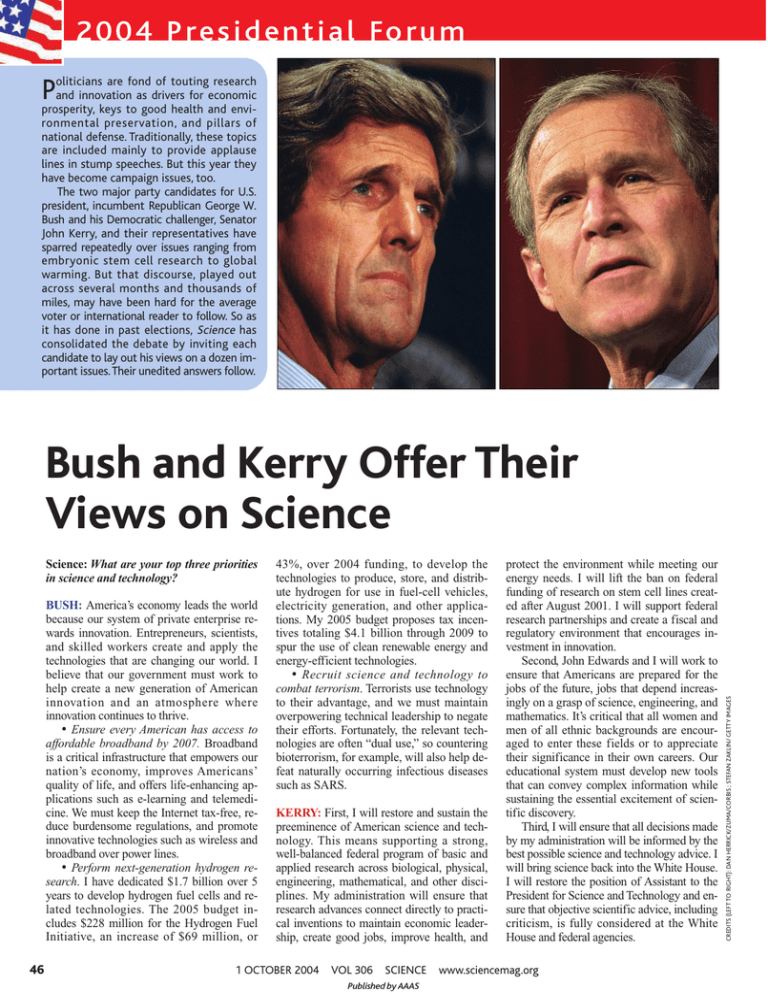
2 0 0 4 P r e s i d e n t i a l Fo r u m oliticians are fond of touting research Pprosperity, and innovation as drivers for economic keys to good health and environmental preservation, and pillars of national defense. Traditionally, these topics are included mainly to provide applause lines in stump speeches. But this year they have become campaign issues, too. The two major party candidates for U.S. president, incumbent Republican George W. Bush and his Democratic challenger, Senator John Kerry, and their representatives have sparred repeatedly over issues ranging from embryonic stem cell research to global warming. But that discourse, played out across several months and thousands of miles, may have been hard for the average voter or international reader to follow. So as it has done in past elections, Science has consolidated the debate by inviting each candidate to lay out his views on a dozen important issues.Their unedited answers follow. Science: What are your top three priorities in science and technology? BUSH: America’s economy leads the world because our system of private enterprise rewards innovation. Entrepreneurs, scientists, and skilled workers create and apply the technologies that are changing our world. I believe that our government must work to help create a new generation of American innovation and an atmosphere where innovation continues to thrive. • Ensure every American has access to affordable broadband by 2007. Broadband is a critical infrastructure that empowers our nation’s economy, improves Americans’ quality of life, and offers life-enhancing applications such as e-learning and telemedicine. We must keep the Internet tax-free, reduce burdensome regulations, and promote innovative technologies such as wireless and broadband over power lines. • Perform next-generation hydrogen research. I have dedicated $1.7 billion over 5 years to develop hydrogen fuel cells and related technologies. The 2005 budget includes $228 million for the Hydrogen Fuel Initiative, an increase of $69 million, or 46 43%, over 2004 funding, to develop the technologies to produce, store, and distribute hydrogen for use in fuel-cell vehicles, electricity generation, and other applications. My 2005 budget proposes tax incentives totaling $4.1 billion through 2009 to spur the use of clean renewable energy and energy-efficient technologies. • Recruit science and technology to combat terrorism. Terrorists use technology to their advantage, and we must maintain overpowering technical leadership to negate their efforts. Fortunately, the relevant technologies are often “dual use,” so countering bioterrorism, for example, will also help defeat naturally occurring infectious diseases such as SARS. KERRY: First, I will restore and sustain the preeminence of American science and technology. This means supporting a strong, well-balanced federal program of basic and applied research across biological, physical, engineering, mathematical, and other disciplines. My administration will ensure that research advances connect directly to practical inventions to maintain economic leadership, create good jobs, improve health, and 1 OCTOBER 2004 VOL 306 SCIENCE Published by AAAS protect the environment while meeting our energy needs. I will lift the ban on federal funding of research on stem cell lines created after August 2001. I will support federal research partnerships and create a fiscal and regulatory environment that encourages investment in innovation. Second, John Edwards and I will work to ensure that Americans are prepared for the jobs of the future, jobs that depend increasingly on a grasp of science, engineering, and mathematics. It’s critical that all women and men of all ethnic backgrounds are encouraged to enter these fields or to appreciate their significance in their own careers. Our educational system must develop new tools that can convey complex information while sustaining the essential excitement of scientific discovery. Third, I will ensure that all decisions made by my administration will be informed by the best possible science and technology advice. I will bring science back into the White House. I will restore the position of Assistant to the President for Science and Technology and ensure that objective scientific advice, including criticism, is fully considered at the White House and federal agencies. www.sciencemag.org CREDITS (LEFT TO RIGHT): DAN HERRICK/ZUMA/CORBIS ; STEFAN ZAKLIN/ GETTY IMAGES Bush and Kerry Offer Their Views on Science C L I M AT E C H A N G E Science: Is human activity increasing global temperatures? If so, should the United States set specific goals with respect to limiting or reducing greenhouse gas emissions by the end of the decade? CREDIT: PETER MACDIARMID/REUTERS/CORBIS KERRY: The scientific evidence is clear that global warming is already happening and rising levels of global warming pollution are making the problem worse. For years in the Senate, I worked with our allies to fight for a balanced global warming treaty. President Bush rejected the Kyoto Protocol, stubbornly walking away from the negotiating table altogether and eroding our relations with global allies. John Edwards and I will take the United States back to the negotiating table, rebuild relations with other nations, and work with them to include the United States—as well as developing nations—in the solution. BUSH: In 2001, I asked the National Academy of Sciences to do a top-to-bottom review of the most current scientific thinking on climate change. The nation’s most respected scientific body found that key uncertainties remain concerning the underlying causes and nature of climate change. As the NAS stated, “Because there is considerable uncertainty in current understanding of how the climate system varies naturally and reacts to emissions of greenhouse gases and aerosols, current estimates of the magnitude of future warming should be regarded as tentative and subject to future adjustments upward or downward.” The NAS found: “Because of the large and still uncertain level of natural variability inherent in the climate record and the uncertainties in the time histories of the various forcing agents (and particularly aerosols), a causal linkage between the buildup of greenhouse gases in the atmosphere and the observed climate changes during the 20th century cannot be unequivocally established.” Based on the NAS study, I launched a comprehensive, long-term policy agenda that focuses on building the most innovative, efficient technologies that will reduce greenhouse gas emissions while allowing the economy to grow. Through research and development into next-generation hydrogen and clean coal technologies, my plan sets a goal to reduce greenhouse gas intensity by 18% over the next decade. This approach has the virtue of addressing the greenhouse gas buildup regardless of its relation to global temperatures and, at the same time, preserving a strong economy. To implement this agenda, my fiscal year (FY) 2005 budget seeks nearly $2 billion in funding for climate change science conducted by 13 federal agencies, up from $1.7 billion in 2002. These federal agencies are im- plementing the administration’s 10-year strategic plan for the U.S. Climate Change Science Program that was released in July 2003 and praised by the NAS in February 2004 as articulating “a guiding vision” and “appropriately ambitious and broad in scope.” I have also established the Climate Change Technology Program to focus on technology to reduce greenhouse gas emissions via renewable energy, fossil energy, and nuclear energy efficiency improvements and carbon sequestration. My FY 2005 budget proposes $5.8 billion for climate change activities, including nearly $3 billion for research on advanced energy technologies (e.g., hydrogen-powered vehicles and power plants, clean coal, fusion power, and carbon capture and storage methods). Both the Climate Change Science and Technology Programs are strengthened by our strong international collaborations. Science: Cap-and-trade programs for greenhouse gas emissions are starting up in other countries. Do you favor such a program for the United States? BUSH: [No response.] KERRY: As John Edwards and I work to rejoin the international community on global warming, we will work at home to take concrete steps to reduce greenhouse gas emissions. Our environmental and energy plans tap the ingenuity of American industry to reduce pollution while creating new jobs manufacturing cleaner technologies. The cap-and-trade system was pioneered in America, where it reduced acid rain pollution at a small fraction of the expected costs. John Edwards and I support a similar approach to global warming, setting concrete limits to reverse the growth in global warming pollution but letting industry find the best path for getting there. CLONING Science: Should U.S. government–funded scientists be allowed to do somatic cell nuclear transfer (research cloning), creating early preimplantation human embryos for research purposes? BUSH: I believe all human cloning is STEM CELL RESEARCH Science: Should U.S. government–funded scientists have access to human embryonic stem cell lines generated after August 2001? Should they be able to create new lines? BUSH: My administration is the first to allow federal funding for human embryonic stem cell research. However, I put in place reasonable ethical requirements for scientists who want to use taxpayer dollars. I believe that scientific discovery and ethical principles can go hand in hand and that we should not use taxpayer money to encourage or endorse the additional destruction of living, human embryos. I remain committed to fully exploring the promise and potential of stem cell research without violating ethical principles and while maintaining respect for all human life. And I have dramatically increased funding for all forms of stem cell research. In addition, NIH is creating a new National Embryonic Stem Cell Bank, which is important for consolidation, reducing costs, and maintaining uniform quality control over the cells. KERRY: Yes. As president, I will lift the current ban on federal funding of research on stem cell lines created after August 2001. Right now, more than 100 million Americans suffer from illnesses that one day could be wiped away with stem cell therapy, including cancer, Parkinson’s, diabetes, and other debilitating diseases. We must make funding for this research and other important scientific work a priority in our universities and our medical community—all while we ensure strict ethical oversight. And we must secure more funding for it at agencies like the National Institutes of Health and the National Science Foundation. www.sciencemag.org SCIENCE VOL 306 Published by AAAS 1 OCTOBER 2004 47 R E S I D E N T I A L F O R U M wrong, and a total ban on human cloning is necessary to ensure the protection of human life as the frontiers of science expand. Anything short of a comprehensive ban would be impossible to enforce and would permit human embryos to be created, developed, and destroyed solely for research purposes. I strongly support a comprehensive law against all human cloning. KERRY: I’m proud to support bipartisan legislation by Senator Orrin Hatch that would make human cloning illegal. This bipartisan legislation includes support for somatic cell nuclear transfer, which would provide greater access to stem cells to conduct the important research we need. We all have loved ones who suffer from diseases that could be cured or ameliorated by this research, including cancer, Parkinson’s, diabetes, spinal cord injury, and Alzheimer’s. This is not a partisan issue. We should not put ideological shackles on the ability of America’s doctors to bring them those urgently needed cures. P U B L I C H E A LT H Science: Should there be any restrictions on using foreign aid for abortions or counseling on birth control methods? S PA C E P O L I C Y Science: Can we afford to send astronauts back to the moon and on to Mars? Should that be the cornerstone of U.S. space policy? If so, what parts of the current program should be scaled back or eliminated to make room for it? KERRY: Today, thanks to decades of public investment in space exploration activities, a rotating international team of astronauts is living and working in space on the International Space Station, a dozen Americans have walked on the Moon, we have rovers exploring the surface of Mars, and an armada of spacecraft continues to explore our solar system. NASA is an invaluable asset to the American people and must receive adequate resources to continue its important mission of exploration. However, there is little to be gained from a space initiative that throws out lofty goals but fails to support those goals with realistic funding. I am committed to increasing funding for NASA and space exploration, because it not only makes critical contributions to our economy, but also expands our understanding of the world we live in. BUSH: My administration firmly believes that the benefits of space technology are far-reaching and affect the lives of every American. Space exploration has yielded advances in communications, weather forecasting, medicine, electronics, and countless other fields. For example, image-processing technologies used in life-saving computed tomography (CAT) scanners and magnetic resonance imaging (MRI) trace their origins to technologies engineers use in space. In January of this year, we committed the United States to a long-term human and robotic program to explore the solar system, starting with a return to the Moon, to ultimately enable future exploration of Mars and other destinations. It will be affordable and sustainable, while maintaining the highest levels of safety. Return missions to the Moon will give astronauts the opportunity to develop new technology and to harness the Moon’s resources to allow manned exploration of more challenging environments. Furthermore, an extended human presence on the Moon could reduce the costs of further exploration, since lunar-based spacecraft could escape the Moon’s lower gravity using less energy at less cost than Earth-based vehicles. The program commits the nation to a fiscally responsible long-term program to explore space through the use of robotic missions and human exploration. This new vision is a measured one that will be executed on the basis of available resources, accumulated experience, and technology readiness. 48 1 OCTOBER 2004 VOL 306 SCIENCE Published by AAAS KERRY: As a senator, I have repeatedly voted against efforts to impose the global gag rule, and as president, I will continue to fight these attempts to silence foreign nongovernmental organizations. BUSH: My administration is cultivating a culture of life. I believe that taxpayer funds should not be used to pay for abortions or to advocate or actively promote abortion abroad. United States’ funding will not be available to international groups that perform abortions, counsel abortion as a family-planning option, or lobby foreign governments on abortion policy. This means that the U.S. government will not use taxpayer dollars to try to legalize abortion in countries in Latin America, Africa, and Muslim countries in which the people are strongly opposed to abortion and believe in the protection of unborn children. Science: Does the U.S. Department of Agriculture’s mission to promote U.S. agricultural products, that is, to eat more, get in the way of efforts to combat the emergent obesity problem? BUSH: I believe we must address the growing epidemic of obesity and poor personal fitness in America. I do not believe the USDA’s mission to promote agricultural products undermines broader efforts to combat the emergent obesity problem. Americans are being encouraged to eat healthier, more nutritious foods like fruits and vegetables and to abstain from consuming excessive amounts of food high in fat and calories. There are important steps individuals can take in their everyday lives to greatly reduce the risk of obesity. I created the Steps to a HealthierU.S. Initiative to coordinate the resources and expertise of federal agencies to encourage Americans, especially children, to make simple improvements in physical activity and make healthy choices. My 2005 budget calls for $125 million, an increase of $81 million, for the Steps to a Healthier U.S. program, which funds innovative programs that use proven methods to reduce the burden of obesity, diabetes, and asthma-related complications in local communities. In launching the HealthierU.S. Initiative, I challenged the President’s Council on Physical Fitness and Sports to retool to better serve youth. The council created the new “President’s Challenge” awards program that draws wide support and is widely available. KERRY: Promoting greater consumption of healthy foods, including fruits and vegetables, does not get in the way of the obesity problem. We must combat this epidemic by instilling healthier lifestyles in our children, including encouraging exercise and better eating www.sciencemag.org CREDIT: NASA 2004 P 2004 P R E S I D E N T I A L F O R U M Great Lakes, and atmospheric ecosystems. KERRY: I worked to pass the legislation in 2000 that created the U.S. Oceans Commission, and I will draw on their expertise and findings in implementing my environmental plan. John Edwards and I have a four-point plan to protect our oceans. First, we will implement tough new protections to monitor beaches and to notify the public of any risks. Second, we will crack down on polluters releasing toxic substances into our waters. Third, we will work to reduce threats from runoff pollution that contribute to beach closings. Finally, we will provide communities with the tools they need to protect their coasts. Science: Does the Endangered Species Act need to be reworked? If so, how should it be improved? habits. This is not only a public health issue, but it’s an economic one. Treating illnesses related to obesity makes up about 9% of national health spending annually. It’s time for our country to get in front of the problem by expanding our national public health system to prevent the onset of obesity and to stop costly illnesses before they destroy lives. SECURITY ISSUES Science: Do you fully support the Reaganera directive (NSDD 189) that establishes a clear line between classified and unclassified research? CREDIT: MARK WILSON/GETTY IMAGES KERRY: Yes. Our security depends on the strongest possible protection of classified material. An effective system requires that the rules are clearly understood, respected, and competently managed. New technologies and new threats from terrorists require expanding the reach of classification. The Bush administration has created a murky area of “sensitive, but not classified” that could both weaken security and undermine the communication essential for productive research. I will replace the new Bush administration rules after carefully considering proposals already made by the National Academy of Sciences and giving full protection to our nation’s secrets and national security. BUSH: The key to maintaining U.S. technological preeminence is to encourage open and collaborative basic research. The linkage between the free exchange of ideas and scientific innovation, prosperity, and U.S. national security is particularly evident as our armed forces depend less and less on internal research and development for the innovations they need to maintain the military superiority of the United States. In the context of the broad-based review of our technology transfer controls that began in 2001, my administration is reviewing and updating as appropriate the export-control policies that affect basic research in the United States. Our new security environment has necessitated new regulations on the dissemination of “critical infrastructure information,” such as the location of hazardous materials. In the meantime, the policy on the transfer of scientific, technical, and engineering information set forth in NSDD 189 has remained and will remain in effect, and I will ensure that President Reagan’s policy continues to be followed. E N V I RO N M E N TA L S T E WA R D S H I P Science: Do you support the recommendation of the U.S. Oceans Commission to create a high-level oceans policy panel led by a senior White House appointee and to double federal spending on marine research over 5 years? BUSH: I appointed the U.S. Commission on Ocean Policy (the Oceans Commission) in 2001 to review a broad range of issues ranging from stewardship of marine resources and pollution prevention to enhancing and supporting marine science, commerce, and transportation, while also giving equal consideration to environmental, technical, feasibility, economic, and scientific factors. The Oceans Commission’s formal submission this fall will inform future budget and policy decisions to sustain healthy oceans for the future. Already, I am moving forward on some of the commission’s preliminary recommendations. In June, I submitted to Congress an “Organic Act” to enhance, among other things, the ability of the National Oceanic and Atmospheric Administration to assess and predict changes in ocean, coastal, www.sciencemag.org SCIENCE VOL 306 Published by AAAS KERRY: John Edwards and I support protecting wildlife and the important goals of the Endangered Species Act. We will implement the act in a cooperative manner that extends the benefits of wildlife and habitat protection to public and private lands. With adequate funding and a cooperative approach that works for both wildlife and property owners, John Edwards and I will continue America’s strong legacy of protecting wildlife. BUSH: The Endangered Species Act (ESA) serves a noble purpose, which Americans overwhelmingly support. For example, ESA led to the recovery of the Gray Wolf, which is why my administration was able to remove it from the list of threatened and endangered species. But even with occasional successes, ESA has been undermined by a flood of litigation, preventing the Fish and Wildlife Service from protecting new species and recovering plants and animals already listed as threatened or endangered. In my view, courts will not save species; focused, results-based conservation programs will. My administration is providing federal grants on a competitive basis to individuals and groups engaged in voluntary conservation efforts on private lands that benefit imperiled species. And with the help of more than $40 billion for wetlands and conservation programs as part of the 2002 Farm Bill, we are providing thousands of acres of new habitat for species and wildlife. I look forward to working with Congress to build on these efforts in modernizing ESA for future generations. ITER Science: By siding with Japan, the United States has contributed to the current stalemate over where to build the International Thermonuclear Experimental Reactor (ITER).Would you shift support to Europe as 1 OCTOBER 2004 49 R E S I D E N T I A L F O R U M VISAS Science: With regard to visa policy, many scientists feel that the pendulum has swung so far toward protecting our borders that the free exchange of ideas is being eroded. Does the government need to remove some of the barriers to entry for those who have a legitimate scientific or educational purpose for coming to the United States? BUSH: My administration values the contributions that foreign scientists and students make to our nation’s scientific enterprise, while recognizing the importance of safeguarding our security. We will continue to welcome international students and scientists while implementing balanced measures to protect our homeland. The science, university, and technology communities have been affected by the stricter visa requirements put into place following the terrorist attacks of September 11, 2001. The administration is actively working to improve many visa, immigration, and security processes impacting international guests and visitors. We are making progress. For example, we have shortened dramatically the process time for visa applications of scientists and students pursuing scientific areas of study. This program has been revised following a recent policy review to shorten processing time. KERRY: We can balance science and security. In the wake of 9/11, America took important steps to improve security for visa applicants to the United States. However, we can improve our visa system to process visa applications for legitimate scientists and students more quickly while still screening individuals that pose a genuine security risk. With more resources and better procedures, we do not need to face a trade-off between scientific exchange and national security. a way to move this project forward? At what point would you withdraw U.S. support for the project? KERRY: Our energy plan will tap America’s initiative and ingenuity to strengthen our national security, to grow our economy, and to protect our environment. I support a strategically balanced U.S. fusion program that includes participation in ITER to supplement a strong domestic fusion science and technology portfolio. As president, my first priority internationally on this and other energy issues will be to engage other nations to find areas of cooperation and common ground. ing the promise of fusion energy through ITER. This project is one of the four “transformational technology” pillars of my climate change strategy, which focuses on building the emissions-free technologies of the future. From an inexhaustible and entirely clean fuel source, a fusion plant could generate huge amounts of electricity to power megacities and to produce hydrogen for transportation needs with no emissions of greenhouse gases. The results of ITER will advance the effort to produce clean, safe, renewable, and commercially available fusion energy by the middle of this century. ENERGY POLICY BUSH: I remain committed to building the ITER project, and based on recommendations from the Department of Energy, I believe Japan is the best location for ITER. My administration will continue to collaborate with all ITER participants, including our European partners, in realiz- 50 Science: Worldwide energy demand is rising at the same time oil production is expected to peak soon and to begin declining. But burning more coal will greatly increase carbon emissions. How would your energy research and development (R&D) priorities address these problems? 1 OCTOBER 2004 VOL 306 SCIENCE Published by AAAS BUSH: I believe America’s energy future must include coal—the key challenge is developing technologies to make it burn cleaner. My Clear Skies legislation, which is the most aggressive presidential initiative in history to reduce power plant emissions, will create a $50 billion market for clean coal technologies. Through Clear Skies, we will cut sulfur dioxide, nitrogen oxides, and mercury by 70%, while maintaining America’s most domestically secure, affordable, and reliable energy source. Additionally, as a key part of my comprehensive national energy policy, I am investing more than $2 billion over 10 years in the clean coal technologies that will transform America’s energy economy, including support for FutureGen, an international, public-private initiative to build the world’s first coal-based power plant that can produce both electricity and hydrogen with virtually no emissions of air pollutants or greenhouse gases. KERRY: Our energy plan will increase and enhance domestic energy sources and provide incentives to help Americans use energy more cleanly and efficiently while creating 500,000 new jobs. The United States can develop and deploy clean energy technologies that will make us more efficient and allow us to capitalize on domestic and renewable sources of energy. John Edwards and I believe that we need clear benchmarks by which to measure the emissions performance of existing and new uses of coal. Our administration will provide a flexible package of incentives to construct state-ofthe-art advanced coal plants, including Integrated Gasification Combined-Cycle (IGCC) coal-fueled power plants. In addition, we will invest in research and development into advanced fossil and renewable fuel technologies and fund research into advanced greenhouse gas mitigation and sequestration technologies. MANAGING SCIENCE Science: Do you support the doubling of the National Science Foundation budget over the next 5 years? KERRY: I have consistently supported major increases in the NSF programs, which provide the foundation for all mission-oriented research. The NSF budget will have a high priority in my administration and will be doubled. The timing of the doubling will depend on how quickly we can recover from the enormous budget deficits created by the Bush administration. I will not subject NSF to the uncertainties faced by NIH—following a bi- www.sciencemag.org CREDIT: ORBAN THIERRY/CORBIS SYGMA 2004 P 2004 P R E S I D E N T I A L F O R U M health. Its work around the country has opened exciting new avenues of research— including stem cell research—that promise even more spectacular advances in coming decades. I will support consistent, sustained growth to expand NIH biomedical research, to invest in health promotion and disease prevention, and to strengthen the ties between NIH and other R&D agencies. Science: How would you reduce the possibility of financial conflicts of interest arising from government scientists who collaborated with industry? partisan plan, its budget doubled from 1998 to 2003, but the Bush administration stopped the growth abruptly and plans to reduce NIH spending in the coming 5 years. CREDITS (TOP TO BOTTOM): JIM YOUNG/REUTERS/CORBIS; BETTMANN/CORBIS BUSH: My 2005 budget provides the highest amount ever requested for NSF and represents a 30% increase over FY 2001. The administration has requested $5.7 billion in FY 2005. Although NSF represents less than 5% of the total federal budget for research and development, it accounts for about 14% of all federal support for basic research and 40% of non–life science basic research at U.S. academic institutions. NSF’s broad support for basic research, particularly at U.S. academic institutions, not only provides a central source for discovery in many fields but also encourages and supports development of the next generation of scientists and engineers. Moreover, in fulfilling its mission, NSF has used its funding efficiently and effectively. Science: After a 5-year doubling, the budget of the National Institutes of Health is now expected to rise by less than the rate of inflation for biomedical research. What budget increase would you recommend for NIH in 2006 and beyond? BUSH: I have demonstrated my commitment to biomedical research by completing a 5-year doubling of the NIH budget to more than $27 billion from a level of $13 billion. NIH entered the postdoubling period far stronger and better positioned to improve health through advances in research. The NIH now trains 1500 more scientists per year and issues 10,000 more research grants than it did in 1998. New insights into human biology and behavior are bringing us closer to prevention strategies and treatments for many of the most dreaded diseases and conditions. The FY 2005 program level for NIH is $28.8 billion, an increase of $764 million (2.7%) over FY 2004, which is greater than the Office of Management and Budget’s estimated rate of inflation. We have not yet fully assessed the NIH’s needs for 2006, but I recognize the importance of this agency’s mission. KERRY: I supported doubling of the NIH budget, beginning in 1998, and will continue to support sustained growth. NIH has a spectacular record in improving human KERRY: Full disclosure and effective, continuous monitoring are essential for any effective strategy for avoiding conflict of interest in corporations, universities, and federal agencies. The senior positions in federal R&D agencies are very demanding and require the overriding commitment of the individual. A modest amount of preapproved, fully disclosed outside activities may be beneficial to the government and the public, as well as industry and the individual. But supplementary income should never exceed some reasonable fraction of the federal salary and should never lead to the reality or the appearance of conflict of interest that could undermine the integrity of agency procedures. BUSH: There are regulations in place to deal with this problem, and I fully support their enforcement. There are strict checks in C R E AT I O N I S M Science: Should “intelligent design” or other scientific critiques of evolutionary theory be taught in public schools? KERRY: I believe that ideology should not trump science in the context of educating our children. Still, public school curriculum is a matter subject to local control. Communities must decide which sound, scientific theories are appropriate for the classroom. BUSH: The federal government has no control over local curricula, and it is not the federal government’s role to tell states and local boards of education what they should teach in the classroom. Of course, scientific critiques of any theory should be a normal part of the science curriculum. www.sciencemag.org SCIENCE VOL 306 Published by AAAS 1 OCTOBER 2004 51 2004 P R E S I D E N T I A L F O R U M place to ensure that scientists are complying with their obligations, and my administration welcomes suggestions from all interested parties as to any additional steps that may need to be taken. BUSH: Many developed countries continue to be concerned about losing their best and brightest students to the United States. Because of our substantial investment in university-based research and the relatively higher status accorded to junior researchers, the United States remains the most attractive nation in the world for young people beginning their research careers. The United States benefits substantially from foreign students. Student exchanges enhance global understanding and increase goodwill toward the United States after students return to their home countries. Many world leaders attended U.S. universities for parts of their education, and foreign students make substantial contributions to scientific research. The United States remains the world’s leading producer of and a net exporter of hightechnology products and ranks among the global leaders in R&D spending, according to Science and Engineering (S&E) Indicators 2004, a biennial report that I receive from the National Science Board (NSB). Indeed, U.S. preeminence in science is not an accident; it is due fundamentally to our openness to scientific exchange, which has enabled us over the generations to benefit from the best scientific expertise in the world. So I am sensitive to the need to attract foreign students and to the obstacles— or perceived obstacles—they may face in our changed security environment. There have been some difficulties as we adjusted our visa application process after the terrorist attacks of September 11, 2001. My administration has worked to streamline this process while improving security. For example, 64% of institutions recently surveyed by the National Association of State Universities and Land-Grant Colleges reported that applications from foreign undergraduate students have either increased in number or stayed constant, while 52% reported increased or unchanged numbers of graduate student applications. In short, we are working hard to ensure that this nation and its institutions of higher learning will continue to attract the world’s brightest young people. KERRY: U.S. science and engineering have a long history of benefiting from the talents of immig rants—par ticularly 52 foreign students. In the wake of 9/11, America took important steps to improve security for visa applicants to the United States. But the Bush administration has implemented the system in a way that makes it difficult or impossible for foreign scholars to attend international meetings or visit home. With more resources and better procedures, we do not need to face a tradeoff between scientif ic exchange and national security. Science: Should Congress be allowed to fund research programs that have not undergone competitive peer review? KERRY: Competitive peer review is at the heart of our highly successful federally supported R&D programs. I am one of the many members of Congress who have strongly criticized “pork-barrel” awards in appropriations bills. There are better ways to help build R&D capabilities in communities and institutions with low levels of R&D funding, such as NSF’s Experimental Program to Stimulate Competitive Research (EPSCoR), the Historically Black Colleges and Universities Program, and support for science and math teacher training. We must also remember that competition in science and technology must meet increasingly stiff international standards. BUSH: Competitive peer review is the cornerstone of the scientif ic establishment. It is a scientif ically rigorous process employed by funding agencies to allocate federal support for innovative research. Peer-review criteria for federal 1 OCTOBER 2004 VOL 306 SCIENCE Published by AAAS programs are clearly established prior to submission of proposals, and the panel of experts is selected to ensure fair evaluation. It is also routinely used by scientific and technological journals to ensure evaluation of quality, objectivity, and integrity of data for publication. It is also the responsibility of the federal government to ensure that the people’s investments in federally sponsored research are well managed and wisely used, which is the focus of my management agenda. In order to ensure that our R&D dollars are invested as effectively as possible, my administration has been expanding the use of transparent investment criteria to help us make decisions on where investments are likely to get us the best returns for our country. Our efforts include applying specific criteria that programs or projects must meet to be started or continued, clear milestones for gauging progress, and improved metrics for assessing results. EPSCoR, started by NSF and now within seven federal agencies, and NIH’s Institutional Development Award (IDeA) Program are excellent examples of successful, competitive, peer-reviewed research programs targeted toward improving our nation’s science and technology capability. The program funds research activities of talented researchers at universities and nonprofit organizations in states and territories that historically have not received significant federal R&D funding. The merit-based program enables researchers, institutions, and states to improve their research capabilities and quality and to compete more effectively for non-EPSCoR research funds and works. www.sciencemag.org CREDITS (LEFT TO RIGHT): AFP/GETTY IMAGES; JIM BOURG/REUTERS/CORBIS Science: Is the United States losing its edge in attracting the best and brightest of foreign students?
